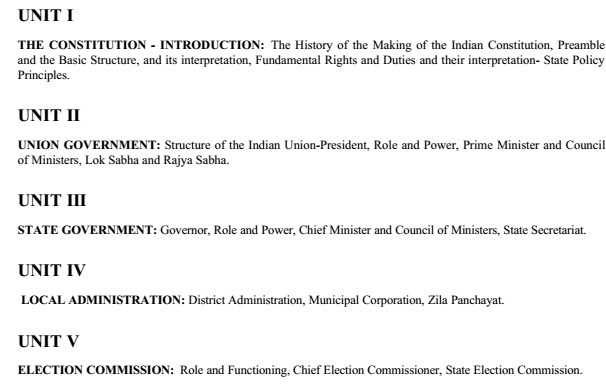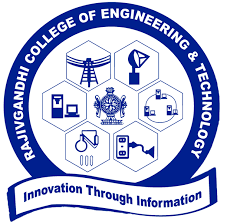
Course Outcomes:
• To create the awareness of The Constitution.
• To understand the structures, roles and functions of the Union Government.
• To understand the structures, roles and functions of the State Government.
• To understand the structures, roles and functions of the Local Administration.
• To understand about the Election Commission.
Program Outcomes (POs)
• Demonstrate a clear understanding of the historical context, values, and principles enshrined in the Indian Constitution, including the Preamble, Fundamental Rights, Duties, and Directive Principles of State Policy.
• Acquire in-depth knowledge about the structure, roles, and responsibilities of the Union and State governments, including constitutional authorities like the President, Prime Minister, Governors, and legislative bodies.
• Develop a practical understanding of the local administrative systems, such as district administration, municipal corporations, and panchayati raj institutions, and their role in decentralized governance.
• Understand the functioning of the Election Commission of India and State Election Commissions, and analyze their role in ensuring free and fair elections and sustaining democratic processes.
• Foster civic awareness and responsibility by understanding fundamental rights and duties, encouraging legal literacy and active participation in democratic and governance processes.
• To create the awareness of The Constitution.
• To understand the structures, roles and functions of the Union Government.
• To understand the structures, roles and functions of the State Government.
• To understand the structures, roles and functions of the Local Administration.
• To understand about the Election Commission.
Program Outcomes (POs)
• Demonstrate a clear understanding of the historical context, values, and principles enshrined in the Indian Constitution, including the Preamble, Fundamental Rights, Duties, and Directive Principles of State Policy.
• Acquire in-depth knowledge about the structure, roles, and responsibilities of the Union and State governments, including constitutional authorities like the President, Prime Minister, Governors, and legislative bodies.
• Develop a practical understanding of the local administrative systems, such as district administration, municipal corporations, and panchayati raj institutions, and their role in decentralized governance.
• Understand the functioning of the Election Commission of India and State Election Commissions, and analyze their role in ensuring free and fair elections and sustaining democratic processes.
• Foster civic awareness and responsibility by understanding fundamental rights and duties, encouraging legal literacy and active participation in democratic and governance processes.
- Teacher: RAJESHKUMAR K
